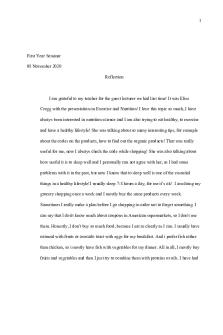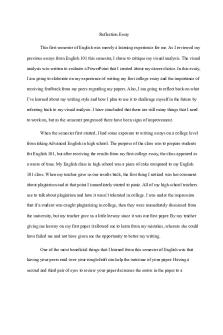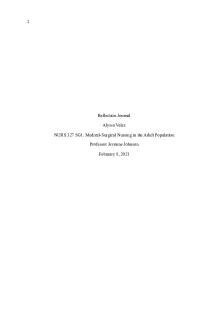Reflection - Grade: A PDF

| Title | Reflection - Grade: A |
|---|---|
| Author | Amanda Martinez |
| Course | Introduction to Psychology |
| Institution | The University of Arizona Global Campus |
| Pages | 5 |
| File Size | 80.4 KB |
| File Type | |
| Total Downloads | 70 |
| Total Views | 165 |
Summary
refledction essay on course...
Description
Running Head: REFLECTION
1
Reflection Instructor Class Date Name
REFLECTION
2
The course of Psychology 101 has taught me not only many things about myself, personality, behaviors, and constructs but also about how I see others. The most intriguing concepts I have learned regards the nurture vs. nature concept. I found it interesting the different theories that disregarded one, but others took both into perspective. Learning how one’s behavior stems from how they are raised and the environment in which they were in, compared to how the biological genes construct one's responses at birth (Feldman, 2015). I also find out many things about myself and others concerning personalities. I never knew that so many vast ideas go to construct one’s personality style together. Learning about the different personality tests such as the Myers Briggs, was quite interesting. I also enjoyed taking a few personality tests online to see if how I felt about myself matched what the analysis concluded. However, the most influential theorists of all to me was Freud. The theory concerning the defense mechanisms rationalization made so much sense. I didn’t know that in certain situations, when I conducted certain behaviors that there was a term for those behaviors. For instance, when I am angry with myself, I will tend to blame those around in my heat of anger when honestly, they have done nothing wrong. As I learned the defense mechanisms, I was enabled to assess whether I use those type of defenses in certain situations. This has played a role in my current life because now when situations arise, I try to restrain from excuses, denying, or placing blame on others. Some reflections have greatly influenced how I could incorporate such mechanisms in my life but in a way that will help me become a better person and to deal with what is going on, which is also using my superego as Freud stated, is the part of the individual that depicts the right and wrong in situations (Feldman, 2015). Some areas in which I struggle with in my life are based on how I think about myself and my image about my self-talk and judgments being placed.
REFLECTION
3
There are rare times that such judgments are verbally expressed, but the thoughts in my head are contributing to the negative self-talk. Even though the judgments I make are in my head, I am sure that sometimes I reflect nonverbal messages of discontent towards what judgments I am making. I have been observing this procedure, and I see that my decisions, as a rule, pursue an apparent risk, for example, an assault on my self-idea or the dread of losing the affections of my better half. I at that point, either endeavor to shoo away the judgment or support its legitimacy. I see this procedure of condemning and after that excusing it as a barrier system for selfprotection. I will keep on checking my manner of thinking and consider what I have found out about protection systems as I move in the direction of self-completion (Feldman, 2015). On a profound dimension and my voyage toward self-realization, I have a more profound feeling of association with the humanistic ways to deal with character. I can identify with Carl Rodger's hypothesis about uneasiness being because of an inconsistency among experience and self-idea (Feldman, 2015). For instance, on the off chance that I unveil my inadequacies with an end goal to be straightforward and my uncovered imperfections are then utilized against me like ammunition, I will in general reconsider in the case of having been straightforward was the best though. There is an inconsistency among experience and self-idea since I esteem straightforwardness. Nonetheless, the emotions that emerge from not being acknowledged unequivocally can be disheartening; much like restrictive positive respect (Feldman, 2015). Also, in my psyche, I legitimized the authenticity of my choices. To me, unforeseen positive regard has a fixing feeling to it and isn't the course I have to push toward. I needn't bother with the person that I love feeling puzzled due to an inconsistency between his genuine self and what I wish he would be, which is a dear that individual needs to look at me. The
REFLECTION
tendency related to inadequate positive regard is all the additionally liberating. When I contemplate this speculation, the best way to deal with portraying what I feel is that of my heart swelling. The chance of individuals to settle without anyone else choices (Feldman, 2015) is universal love and affirmation, and these states of being I regard and need to create toward. Currently, I have been interested in working towards a career in Transpersonal Psychology. I have been a little nervous concerning my journey unfolding into the near future, but I am sure that this course along with the future psychology courses will have me well prepared for the field I want to get into. Psychology is very vast and so many different topics, theories, concepts, sometimes can be a bit confusing. However, when one is interested in the subject, they are bound by knowledge in which they are enforcing upon themselves. I became intrigued by Jung and Rogers, the Humanistic Perspective, and the state of consciousness (Adler & Proctor, 2011). I wasn’t expecting to achieve such vast knowledge that would aid my future
career goals, but I unsurprisingly, I have. This course was a great introduction and has enabled me to become more motivated to continue learning what psychology can teach. In general, there is a first-rate gain to any student for taking an Introduction to Psychology course. Gaining knowledge and perception to the many forces that are at work with the way we assume and behave is priceless. Even if a student is not pursuing a career in psychology, it is invaluable to develop one’s grasp of themselves and those they engage within the world (Adler & Proctor, 2011). Any given individual is positive to relate to some theories and ideas in this introductory classification and as a result, improve a higher recognition of themselves and others. This course has given me the basic knowledge of psychology whereas in later psychology courses, I can apply what I have learned to enhance and broaden my perspectives of psychology to aid my future career.
4
REFLECTION
5
References Adler, R.B., & Proctor, R.F., (2011). Looking out, looking in (13th ed.). Boston, MA: Wadsworth. Feldman, R.S., (2015). Essentials of understanding psychology (11th ed.). New York, NY: McGraw-Hill Education....
Similar Free PDFs

Reflection Essay - Grade: A
- 2 Pages

Final Reflection - Grade: a
- 3 Pages

Reflection 2 - Grade: A+
- 2 Pages

Reflection nutrition - Grade: A
- 3 Pages

Reflection - Grade: A
- 5 Pages

Reflection essay - Grade: A
- 3 Pages

Reflection Journal - Grade: A+
- 2 Pages

Self Reflection Paper - Grade: A
- 7 Pages

Reflection 5 audit - Grade: A
- 2 Pages

MKT Reflection Paper - Grade: A
- 1 Pages

Reflection Paper #3 - Grade: A
- 8 Pages

Reflection #2 - Grade: B
- 3 Pages

Reflection - Grade: B+
- 2 Pages

Midterm Reflection - Grade: 95
- 2 Pages
Popular Institutions
- Tinajero National High School - Annex
- Politeknik Caltex Riau
- Yokohama City University
- SGT University
- University of Al-Qadisiyah
- Divine Word College of Vigan
- Techniek College Rotterdam
- Universidade de Santiago
- Universiti Teknologi MARA Cawangan Johor Kampus Pasir Gudang
- Poltekkes Kemenkes Yogyakarta
- Baguio City National High School
- Colegio san marcos
- preparatoria uno
- Centro de Bachillerato Tecnológico Industrial y de Servicios No. 107
- Dalian Maritime University
- Quang Trung Secondary School
- Colegio Tecnológico en Informática
- Corporación Regional de Educación Superior
- Grupo CEDVA
- Dar Al Uloom University
- Centro de Estudios Preuniversitarios de la Universidad Nacional de Ingeniería
- 上智大学
- Aakash International School, Nuna Majara
- San Felipe Neri Catholic School
- Kang Chiao International School - New Taipei City
- Misamis Occidental National High School
- Institución Educativa Escuela Normal Juan Ladrilleros
- Kolehiyo ng Pantukan
- Batanes State College
- Instituto Continental
- Sekolah Menengah Kejuruan Kesehatan Kaltara (Tarakan)
- Colegio de La Inmaculada Concepcion - Cebu

